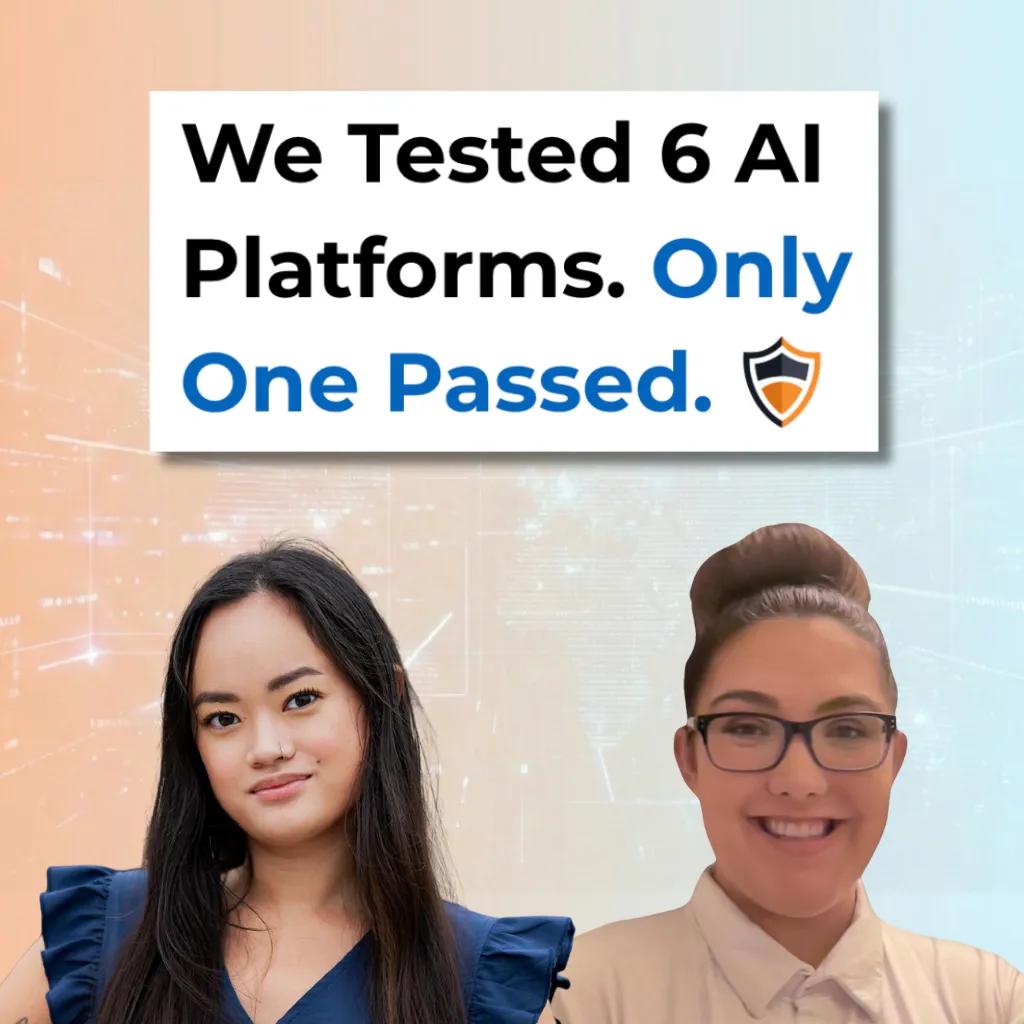Can Psychologists Use AI for Clinical Documentation?
Yes, and it's transforming how mental health professionals create clinical reports. A few years ago, I started hearing about AI tools in the testing psychologist community on Facebook. As a licensed psychologist working across the lifespan with both clinical evaluations and forensic cases, I was intrigued but cautious.
I went down a rabbit hole with the research. I needed to understand how this technology would affect me as a clinician and what the ethics looked like. One requirement was non-negotiable: lack of HIPAA compliance for AI tools was a dealbreaker.
All of the research kept pointing to BastionGPT as being HIPAA compliant and at the top of the tier. That's what led me to Bastion. I became an early adopter over two years ago, and I've been able to see the platform continue to grow, which has been wonderful.
The Challenge: Writing Clear, Compliant Clinical Reports
I'd already adopted a philosophy about clinical documentation: if you can't say what you need to say in a sentence, do you really know what you need to say? That supervisor's wisdom had stuck with me from graduate school.
Forensic reports present unique challenges because they end up in judges' hands and live online permanently. The question became: how could AI help me communicate clearly and succinctly while capturing everything required by courts, agencies like DSHS, and professional standards?
How to Use AI for Psychology Reports: Getting Started
Learning AI Prompts for Clinical Documentation
Working with AI for psychological assessments has been like building a relationship. You should be very concrete and specific because AI is hyper-literal. It's almost like speaking to a kid where you're teaching them to do something. If you don't tell it you want bullet points, it won't give you bullet points, even if you expected them.
I built my prompting skills through experimentation. I'd open up a new chat and try different words, different adjectives, different ways of describing what I needed. When I found something that worked, I'd save it. Now I have a library of prompts that consistently deliver results.
Here's something personal: I'm nice to BastionGPT. I say please and thank you all the time. I feel like it's my friend. It's almost like a personal assistant; it helps me a lot. So I'll say, "Oh, thank you buddy" when it gives me exactly what I need. Maybe that seems silly, and I know it's probably not necessary, but it keeps me from becoming dictatorial in my interactions.
Key insight for AI prompting: Examples are incredibly helpful. Showing the AI the formatting you prefer, giving it samples of your style; that makes a huge difference in the output.
AI Workflows That Transform Clinical Documentation
Using AI for Psychological Assessment Tables
I'm big on aesthetics. My reports end up in judges' hands and online forever, so I want them to look professional and presentable. Tables became my biggest breakthrough with AI for psychology reports.
One day I was working with an IQ test table, trying to organize subtests, scores, and percentiles in a meaningful way. I'd sunk an hour into this table, just messing with formatting. I finally turned to BastionGPT and said, "OK, here's what I was thinking the X and Y axis should be. What would be most helpful? How can I present this data in a meaningful way?"
The result was exactly what I needed. That's been repeated so many times now. Then I took it further: "In 7th grade language explain what this means so a parent will understand it." The output was brilliant. Patients consistently appreciate the visuals and accessible formatting that breaks up the monotony of just a solid block of twelve-point font, single-spaced text.
Multi-Document Synthesis for Clinical Evaluations
One of my most powerful workflows is for patient evaluations using HIPAA-compliant AI. I upload three documents to BastionGPT:
- The DSM-5-TR criteria
- My clinical notes from the session and diagnostic criteria
- Test scores (like the MIGDOS evaluation)
My prompt is straightforward: "Tell me how this patient meets the DSM-5-TR criteria for a specific diagnosis. Tell me all the criteria that it would make in a table, so it's easy to read."
I've also pre-loaded reference materials, like the uniform American Academy of Clinical Neuropsychology test scores standards I use for scoring. BastionGPT synthesizes all of that prepared data exactly as needed. I can do that work by myself, but if it can synthesize everything after I've done the bulk of the clinical work, I just need it to do that.
How to Prevent AI Hallucinations in Clinical Reports
Here's the key to accuracy: I tell BastionGPT, "Write the page number you found this information on and do not make anything up." I put it on “exact” response mode. I'm almost like a parent with my instructions, very specific and clear. Then it listens.
But I always cross-reference and fact-check; is it 99th percentile? Is it 87%? Does this align with what I'm clinically seeing? Generative AI tools like BastionGPT occasionally hallucinates. I've seen it claim a ninety-nine percentile score that was definitely not correct, so proofreading and verification is essential.
AI Quality Control for Mental Health Professionals
Maintaining Clinical Standards with AI
Bastion doesn't have my license, so I need to stand behind everything that goes out under my name. But the verification process isn't burdensome; it's just good clinical practice.
BastionGPT is also a good quality control for me and my team. Grammar checking has been huge. I upload my two- or three-page reports and BastionGPT catches pronoun errors, spots when I've accidentally referenced John's name in Suzy's report because I reused a template. These catches prevent errors before they go out.
But I don't just accept AI output as-is. I'll tweak it because I want my reports to read the same way I talk. I'll take what BastionGPT says and refine it because I don't quite talk that way. I'll shave some pieces off. The voice needs to be authentically mine.
BastionGPT also helps with analogies. Sometimes I'll ask, "What's a good analogy to explain XYZ to a patient?" It gives me ideas; it doesn't do the job for me, but it helps me capture things in ways my clients need.
Time Savings: AI Efficiency in Psychology Practice
Time savings appear everywhere when using AI for clinical documentation. Instead of typing out three diagnoses with F84.0 and all the Z codes and abbreviations, in alphabetical order, BastionGPT handles that formatting. Clinical reports are distilled down to one-page formats where appropriate. These aren't marginal improvements; they're meaningful time savings that accumulate across every report, every week.
The impact? I'm able to take on a lot more patients because BastionGPT has helped me polish my already-streamlined reports. The efficiency gains have been substantial enough that I can serve more people without sacrificing quality.
Training Your Team to Use AI for Psychology Reports
I've given prompts to my staff members. I tell them, "Have Bastion read it and tell you what can I improve? What makes sense? What's inconsistent? What am I missing? What did I misspell?" Always with the caveat: "Don't blindly listen to it. Just see if it gives you a different perspective."
Their reports have gotten so much better as a result. I've noticed the improvement consistently.
With patients, I'm transparent. It's in our informed consent documentation. They know we use AI to make information more presentable and user-friendly. The feedback has been positive; patients really like the tables and formatting that make complex clinical information accessible.
AI Ethics in Clinical Psychology: Finding Balance
I see the clinical community polarized around AI for mental health professionals. There's one camp that absolutely refuses to engage with it, viewing it with deep suspicion and drawing hard lines against adoption. Then there are people on the opposite extreme who embrace it without any critical oversight, and honestly, many have got their blinders on. I'm concerned when people accept everything without question.
I'm firmly in the middle. It's not the be-all and end-all. We've still got to use our brains. We're here to have AI really add to our work and bolster what we're already doing. Balance is the key - be critical and curious when using AI.
Blindly copying and pasting is plagiarism. That's not appropriate professional practice. If you just put in a prompt and copy and paste without review, that's a serious problem. But it's also not realistic to completely dismiss this technology. It's here. Whether we like it or not, it's around us, and we've got to adopt it in some way.
BastionGPT is another tool in my toolkit to build a better clinician. That's how I see it. The more we can educate ourselves on ways to integrate it that are appropriate, informed, and meaningful, the more helpful it can be.
Best Practices: AI for Psychologists
For colleagues considering AI adoption for clinical documentation, here's what's made the difference for me:
1. Connect with Other Practitioners
Talk to people who are already using AI tools for psychology reports. Connect with colleagues who are using these tools. Learn from their experience.
2. Prioritize HIPAA Compliance
Keep a level head. Find that middle ground between rejection and blind acceptance. Always verify HIPAA compliance before uploading any patient information.
3. Be Specific with AI Prompts
Be hyper-literal and specific. You're going to get frustrated if you haven't told it to do something in bullet points but expected it to. Be as specific as possible.
4. Use Examples to Train AI
BastionGPT loves examples. Show it how you want things formatted, and it'll match your style.
5. Build a Prompt Library
Save your prompts. Build your library. When you find instructions that work, preserve them.
6. Experiment Safely
Have fun with it. Be open to playing with it and experimenting to see what it can and can't do. Open new chats to test different approaches.
7. Always Verify AI Output
Fact-check important data points. The AI doesn't hold your credentials. But this isn't burdensome; it's the same verification you'd do anyway.
8. Never Plagiarize
Never blindly copy AI output. Bastion doesn't have my license; I need to make sure I stand behind everything.
The Future of AI in Clinical Psychology
I love BastionGPT. It works for what I need. I've figured out prompts and ways to interact with it, ways to have that back and forth to get exactly what I'm looking for.
The technology keeps improving. Over my two-plus years of use, I've watched the iterations and enhancements. It's been genuinely exciting to be part of that evolution.
This isn't about replacing clinical judgment. It's about having a tool that saves time on routine tasks, improves presentation quality, catches errors, and frees up mental space for the clinical work that only licensed professionals can provide.
For those still on the fence: BastionGPT has made AI integration straightforward. The learning curve is manageable. The benefits are real. And the middle ground, thoughtful adoption with appropriate oversight, is where innovation happens.
After all, Bastion doesn't have my license. But it's become an invaluable assistant in helping me fulfill the responsibilities that license demands.
Frequently Asked Questions (FAQ)
Is AI safe for psychological reports?
Yes, when you use BastionGPT's HIPAA-compliant AI tools and maintain proper oversight. The key is verification: never blindly copy AI output. Always fact-check clinical data, ensure the voice matches your professional style, and stand behind everything that goes out under your name.
What is HIPAA-compliant AI for mental health?
HIPAA compliant AI for mental health refers to artificial intelligence tools that meet Health Insurance Portability and Accountability Act requirements for protecting patient information. This means the platform has proper security, business associate agreements (BAAs), access controls, and privacy measures to protect patient data. BastionGPT is specifically designed to meet these HIPAA compliance standards and best practices for healthcare professionals.
How do psychologists verify AI-generated content?
I use several verification methods:
- Exact mode instructions: I tell the AI to "write the page number you found this information on and do not make anything up"
- Cross-referencing: Check percentiles, scores, and clinical data against source documents
- Clinical alignment: Ensure AI interpretations match what I'm seeing clinically
- Grammar and consistency checks: Review for pronoun errors, name mix-ups from templates
- Voice matching: Refine AI output to match my professional voice and communication style
Can AI replace clinical judgment in psychology?
No. AI is a tool to augment clinical work, not replace professional judgment. Bastion doesn't have my license, so I need to stand behind everything in my reports. AI helps with formatting, organization, grammar checking, and synthesizing prepared data, but the clinical interpretation, diagnosis, and treatment planning remain the psychologist's responsibility.
What are the best AI prompts for psychology reports?
Effective AI prompts for clinical documentation should be:
- Hyper-literal and specific: Tell the AI exactly what format you want (bullet points, tables, etc.)
- Include examples: Show the AI your preferred style and formatting
- Set clear boundaries: Instruct it not to make anything up and to cite page numbers or provide a direct quote
- Use 7th-grade language: When creating patient-facing content, specify reading level
- Request specific structures: "Create a table showing how this patient meets DSM-5-TR criteria"
How much time does AI save in clinical practice?
The time savings accumulate across every report. Instead of manually formatting diagnoses with ICD-10 codes, creating tables from scratch, or spending hours on document formatting, AI handles these routine tasks. I'm able to take on significantly more patients because BastionGPT helps me polish my already-streamlined reports. The efficiency gains have been substantial enough that I can serve more people without sacrificing quality.
Do I need to tell patients I use AI for reports?
Yes, transparency is important. I include AI use in our informed consent documentation. Patients know we use BastionGPT to make information more presentable and user-friendly. The feedback has been consistently positive; patients appreciate the tables and formatting that makes complex clinical information accessible.
What's the learning curve for psychologists using AI?
The learning curve is manageable. It involves experimentation: trying different prompts, seeing what works, and building a library of successful instructions. Think of it like teaching someone new; you need to be specific about what you want. Most psychologists can start getting useful results within a few sessions of experimentation. The key is being open to playing with it and testing different approaches.
How do I choose HIPAA-compliant AI tools for my practice?
When evaluating AI tools for clinical psychology:
- Verify HIPAA compliance (this is non-negotiable)
- Check for Business Associate Agreement (BAA) availability
- Review security measures (encryption, access controls)
- Test the platform with non-sensitive information first
- Connect with other practitioners who use the tool
- Evaluate customer support and documentation
- Consider specialty features for psychology and mental health
Research consistently pointed to BastionGPT as meeting these standards, which is why I chose it as an early adopter.
About the Author
Dr. Anna DiNoto is a licensed psychologist specializing in neurodiversity and forensic as well as clinical evaluations. She practices in the Pacific Northwest and provides expert testimony in legal proceedings. Dr. DiNoto has been using HIPAA-compliant AI tools in her clinical practice for over two years.
Related Resources:
BastionGPT Use Cases for Mental Health Professionals
Healthcare AI Prompts: Building Your Clinical Library
Begin your journey with a 7-day Free trial of BastionGPT.
If you have questions or want to connect:
- Email: [email protected]
- Phone: (214) 444-8445
- Schedule a Chat with BastionGPT experts: Book a Meeting




.png)
.png)